- Home
- Megan Shepherd
The Secret Horses of Briar Hill Page 5
The Secret Horses of Briar Hill Read online
Page 5
Benny comes charging into the kitchen and jerks the screaming kettle off of the stove. I can smell metal burning. I expect him to yell at me for letting it boil clean dry of water, but he doesn’t. He sets it on a wooden trivet and gives me one long look, and then his eyes flick to the stairs, where we can both hear Anna’s bone-deep coughs.
“You should have left it,” I say. “You should have let it keep whistling.”
“Emmaline—” His voice, for once, isn’t a sneer.
He’s seen my tears. But I don’t want his pity! I shove past him and run outside into the frozen world of snow and ice. Cold stings my bare hands—I’ve forgotten my coat, but I can’t go back. I run and run though my lungs scream at me to stop. When the princess had this place built, did she imagine that one day children would die here, crying so loud you could hear it even over a screaming kettle? Did she think, while she threw open the doors and let music pour onto the back lawn, that one day a black winged horse would circle around and around the roof, tirelessly, always on the hunt?
I collapse in the snow. The coughing fit hits me hard.
The barn door is ajar. Steam is coming from the crack. I pull it open to investigate, cautiously, in case Thomas is there, but it is only the sheep. They are pressed so tightly together, and there are so many of them, that their heat makes the barn as warm as toast from the oven. I crawl over the stall gate and curl up in the middle of them, in the straw and wool and breathing bodies, and at last feel warm.
WHEN I WAKE, I am in my own bed.
My sheets are soaked with sweat. I don’t know who found me in the barn and brought me back. My dreams were coffee-scented, and Thomas is the only one who drinks coffee, though Benny takes a sip every now and then and pretends he likes it. But I can’t picture a one-armed man carrying me, even though I saw him pick up that lamb and throw it over the fence into its pasture. I wrap a blanket around my dress and shuffle down the stairs and hover outside of Anna’s room. The door is open a crack. Sister Mary Grace is there, tidying up spilled broth.
I can see the bedsheets rising and falling as Anna breathes. She is asleep. Alive. Voices come from downstairs. Sister Constance must be back with the medicine.
I’ve slept through supper, but the Sisters have left me some ham beneath a napkin. As I sit alone at the kitchen table and eat, something moves in the reflection of the copper teakettle. The angles of the kitchen are warped in its curving sides, so that the ceiling looks tiny, and the fireplace inflates into a roaring inferno behind me. My nose is the size of a swollen plum, my eyes unnaturally small. A gray winged horse is nosing around the table behind me, probably hungry for toast with jam. It snuffles against my mirror-chair, then against my mirror-shoulders. I shiver, even though my real shoulders have felt nothing. A stick cracks in the fire, and the horse turns toward it. Afraid of the flames or curious, I am not sure. It stretches its wings so suddenly that I duck.
“Be careful,” I whisper. “The fire could burn you.”
Does my voice carry to the world beyond the mirror? The gray horse swivels its head to the left, then to the right, then folds its wings and walks into the ground-floor hall.
I push away the kettle. I do not want to see my reflection. The hair that has grown back unevenly. My hand drifts up to untangle the tufts, and I taste ashes that don’t have anything to do with the kitchen fire. Even without the kettle’s distortions, Benny is right. I do look odd.
Can I tell you a secret?
This is not the first hospital I have been in. I have not always had the stillwaters. That came later, after the fire, after the bandages. After the horses kicking at their stall doors, and no one to let them out.
The kitchen door slams, and the three little mice come in with red cheeks. They’ve recruited a fourth into their ranks now: Arthur, the blond boy who never speaks and sucks his thumb. They’ve dressed him as a pirate prince and given him a shiny kitchen ladle as a sword, but he’s only gazing at his own reflection in it. Kitty, the leader of the mice, holds up two long black feathers. They look like crow feathers, except they have a sheen like wax and are the length of her arm.
“Look what we found on the terrace!”
She holds one feather in each hand, flapping her arms like a giant bird and cawing at the ceiling, and the girls giggle and run down the hall.
WHEN I WAS FIVE, my sister Marjorie found a wounded bird in the street. Our neighbor’s cat had gotten it and thrashed it about, before Marjorie chased it off. The bird didn’t move, though its heart flit-flit-flitted beneath our fingertips. Its body was so soft, as though just touching it might break something. Marjorie made a cage out of an old sieve and filled it with leaves. We dug through Mama’s garden for worms, and chopped them up, and fed them to the bird on the end of a small twig. Our neighbor said the bird would never survive, but Marjorie was patient. Every day, she dug for more worms. After three weeks, the little bird was flapping its wings around, trying to take off in the makeshift cage. We carried the cage to the edge of the empty building behind the bakery. Marjorie opened the door, and the bird flew away.
But Foxfire isn’t that little bird. I do not think worms and a bed of leaves will fix her.
She is waiting for me as I crawl over the garden wall. My spine tingles as I meet her eyes. I still can’t believe she’s real, but here she is, standing in front of me. The torn skin on her right wing is raw, and the dent in the bone looks painful. She tries to stretch out her wings. Her left one will extend, but the right one catches.
“I have something for you,” I say softly.
Her ears perk up when my hand goes into my pocket, but her eyes are still wary. She is used to the wind and the sun, not to little girls.
“The Horse Lord wrote me that you liked these.” I take out the shiny red apple I got from Thomas. Her ears swivel forward, curious. She raises her right hoof, but then lowers it again. I take a slow step forward, with the apple resting in my flat palm. “It’s all right. I’m not going to hurt you. I just want to give you this apple.”
When I reach the fountain, my bulky coat knocks off the willow stick, and she jerks at the whip of movement. Her eyes flash their whites.
“Easy, Foxfire.”
But the next step I take is too far. She snorts and paws the snow with muddy hooves. Her thick mane flies as she tosses her head, warning me back.
I stop.
Slowly, I crouch to the earth and roll the apple to her corner of the garden. She stops thrashing. Her eyes never leave me, but she lowers her head. Sniffing. Snorting. Her inquisitive lips grope until they feel the shape of the apple.
She jerks her head up, and munches on it contentedly.
I back up slowly, until I reach the sundial, where there is a new letter tucked under the golden arm, tied in ribbon. I unroll it while Foxfire finishes the apple.
Dear Emmaline May,
I must once again ask you for assistance. Though I thought it impossible, the Black Horse has crossed over into your world and is, at this very moment, in pursuit of Foxfire.
The Black Horse is strong and relentless, but he has one weakness, and it is this: color. Color burns his eyes. The only light he can see by is colorless moonlight—the brighter the moon, the clearer he sees. Tonight, there is a new moon, which means the sky will be dark and he will have to hunt by smell alone. But as the moon grows brighter each night, you must surround Foxfire with colorful objects large enough to be seen from a distance—one for each color of the rainbow—to create a spectral shield that will hide her from his vision even during the brightest full moon.
I beg you to accept this mission of utmost importance.
Ride true,
The Horse Lord
I stare at the letter with wide eyes.
I am to protect Foxfire?
I am to undergo a mission of utmost importance, all on my own? No, no, I can’t possibly. Feeding her and caring for her is one thing, but this is quite another. My heart starts to swell with that rat-a-tat fear, and I want to
crawl over the wall and run, run away from the letter.
But the Horse Lord is depending on me.
I hold the ribbon up to the light. If I’m to find colorful objects, then could this be the first? It is thick and long, surely long enough to be seen from a distance. It is red, but looking closer, it is more than that. Sometimes when it catches the light it is cherry red, other times the same red as the emblems painted on the army trucks that rumble by.
Foxfire is still munching on the apple, but her eyes are fastened to the ribbon. I glance at the ivy covering the garden wall. The vines twist around themselves to form little nooks and pockets, like a fairy shelf. I find a sturdy vine and tie the red ribbon around it so that it flickers in the wind. It is bright and shiny against the dull dark green. I take a step back, and then another, and it still shines brightly.
Yes, I think. Yes, maybe I can do this.
But a cloud covers the sun, and I squint up at the sky.
One red ribbon will not be enough.
I must find something blue, and green, and yellow, and all the other rainbow colors in shades bright enough to blind the Black Horse when he comes for Foxfire. And he will come. I know this. Even now I can feel him circling just beyond the clouds. His black hooves tear up wisps of white-gray as he circles and circles, pulling the winds with him, stirring thunder in his wake.
But where to find blues and greens and yellows? The only colors at the hospital are on little paper tickets attached to our doors that would dissolve in the rain. There are no flowers now. No rainbows arching in the sky after an April rain shower.
The last time I saw a rainbow, I was running home with Marjorie after school, darting from doorway to doorway to escape the spring rain. She made it into a game. Water was poison gas; each drip was one day off your life, so we had to run and run and run, before we had no days left. The rain came harder, and she pulled me into the doorway of a theater. “If we don’t hide,” she said, “We’ll have no days left.” She hugged me close and pointed above the church, where a double rainbow spanned the steeple. “Look!”
Everything at Briar Hill is white snow and gray stone. It is the dull browns and greens of soldiers’ uniforms, and the black of nuns’ habits. No wonder we have drawn the Black Horse straight to us. Our world is colorless midwinter.
I close my eyes and think of that day in the rain. Marjorie’s bright yellow raincoat. My blue socks. The lively pink in our cheeks, not the burn of fever in Anna’s. I take off my mittens and press my cold hands to my face. I miss Marjorie so much, I could cry. I don’t know what to do without her singing me to sleep, making games of rainstorms, sneaking me slices of apple pie. It has been so long since I’ve seen so many colors all together that I’m afraid I might have forgotten them. The only blue I can picture now is a watery sky. The only yellow the murky medicine Dr. Turner gives us. But there must be more out there. There must be brighter things.
Something nudges me from behind.
I turn and gasp. Foxfire is right behind me. Her muzzle is poised to nudge my shoulder again, her warm horse-breath on my neck, her ears swiveled forward. I dare not move, afraid to spook her. She dips her head, horse-lips searching the folds of my coat, until she reaches my pocket. When she discovers that it is empty except for chalk, she snorts.
“I’ll bring you another apple soon,” I say when I can find my words. “And I’ll collect colors to protect you. I won’t let the Black Horse get you. I promise.”
Slowly, slowly, I lift my bare hand.
I bring it down on her muzzle. A single touch. I feel her velvet coat, her gentle warmth. She is so powerful. And then she tosses her head and prances off to her corner of the garden and watches me.
I smile.
It is a start.
I flip over the letter, and write on the back:
Dear Horse Lord,
I was afraid that I’d forgotten all the colors of the rainbow, but I know just where I can find them again. You can count on me.
Truly,
Emmaline May
ANNA’S COLORED PENCILS were a gift from Dr. Turner.
Anna has been at Briar Hill longer than any of the rest of us. She came two years ago on the first trains rumbling through the countryside. She brought two beaten-up suitcases with her. One was full of winter coats and stockings that her mother had packed. The other was full of naturalist books—that one she had packed herself. Sister Constance said Anna used to like to wander the gardens, like me, long before they were eaten by ivy. She would sit on a bench and read and read and read amid the spring flowers. But then the stillwaters got worse with the summer rains, and by August she was bedridden. She couldn’t see the flowers anymore. Dr. Turner brought her the pencils so she could draw them. I don’t think anyone has ever told her that all the flowers have long since died.
I knock on her door.
“Come in.”
Her voice is tired.
I push open the door, and she smiles and pats the bed, but I don’t climb up. There is a handkerchief in her hand that is primly folded, mostly hidden in her palm, and I wonder if there is blood inside. She has the mirror on her nightstand tilted away from her face. In its reflection, I can just make out winged horses beyond the mirror-window, grazing in the dead grass, with their wings folded tightly against the wind.
The winged horses are stirring.
“May I see your colored pencils?” I ask.
At first, I had thought to use the pencils for the spectral shield. But I could never take Anna’s beloved pencils away from her, not even to save Foxfire. And besides, the Horse Lord said the objects had to be large enough to be seen from a distance. But they can still help me remember the colors of the rainbow. They can be my guide.
Anna leans forward to open the secret desk drawer, and the motion stirs the stillwaters. Murkiness rises in her lungs, and she muffles a cough. She takes out the box of colored pencils and some paper, but I shake my head.
“I don’t need paper.”
She gives me a curious look, but doesn’t ask. She sets the box on the bed. Anna is nothing if not organized, and the eight pencils are arranged just as the manufacturer boxed them, a spectrum of rainbow colors.
845-CARMINE RED
848-BLUSH PINK
849-TANGERINE ORANGE
863-CANARY YELLOW
865-EMERALD GREEN
867-SEA TURQUOISE
868-LAPIS BLUE
876-HELIOTROPE PURPLE
I press my finger into the tips of each pencil that Anna keeps so carefully sharpened.
“What’s wrong, Emmaline? You look unhappy.”
“I need to borrow them.”
It is Anna’s turn to look displeased. “We’ve talked about this. You can have paper and chalk, and you can use the pencils here in my room anytime you want, but they are too dear to me. I’m sorry, you can’t take them with you.”
The Horse Lord’s letter is stiff in my pocket. I run my finger over the paper’s edge again and again. My eyes shift to the mirror on her side table. The winged horses are stirring. The winds are growing stronger on the other side of the mirror, sweeping their manes and long tangled tails into their eyes. One in front, a dark brown horse with a bald face, throws its head toward the sky as if sensing danger. If I tell Anna how dire Foxfire’s situation is, she might try to go outside again. And I am afraid of how thin her arms look. Afraid of what more snow would do to her.
“Why can’t you just draw with them here, like you usually do?” She motions to the fan of drawings laid out on her bed.
I slip my hand out of my pocket.
“It’s a secret.”
“Does this have to do with the winged horse in the sundial garden?”
I pause. “Her name is Foxfire.”
Anna’s eyes, for just a second, flick to the mirror. Inside it, the horses are starting to run now. Faster and faster, racing the wind, across the front lawn. They’re almost to the stone fence that separates the hospital grounds from Mr. Mason’s far
m. The horse in front stretches out its white-tipped wings at the last minute and soars. Does Anna see the horses? Does she see them fly?
But no. She is only looking at the dried lavender next to the mirror. Sister Constance says the smell is good for the stillwaters, but I think it must be the shape of the flower that Anna likes best, because she draws it over and over.
Anna runs her fingers over the box of pencils. “Well, it sounds very important, so you may borrow one at a time,” she says. “Which would you like first?”
I point to 863-CANARY YELLOW. The color of Marjorie’s raincoat. Anna draws it out of the box with fingers that are so fragile and so white that they could almost be bone china.
I study the pencil. I think of all the things that are yellow in the hospital. Butter. Sweet corn. Tinned peaches. My stomach grumbles. It’s almost teatime. The smell of broth is coming from downstairs, and then Sister Mary Grace walks in with a tray of leek stew and a glass of water for Anna.
“Emmaline,” Sister Mary Grace says, “go round up the little ones and tell them tea is nearly ready.”
I slip the yellow pencil in my pocket next to the Horse Lord’s curled note. I couldn’t put butter or sweet corn or peaches in the sundial garden. Foxfire would just eat them.
I go to the library, and to the ballroom filled with wooden benches to make a chapel, and finally find the three little mice and Arthur outside, sitting on the kitchen stairs.
“It’s teatime,” I say. They jump at my voice and then giggle in their mouse language, which poor mute Arthur must not understand, because he starts sucking his thumb. He stares at me with his big wide eyes, and then looks past me at the tin laundry tub, and then Beth pokes him and they all scamper past, into the kitchen. I grab hold of Susan, the littlest mouse.

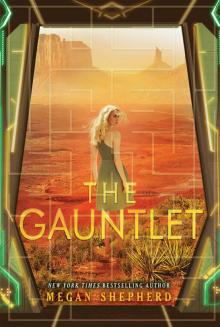 The Gauntlet
The Gauntlet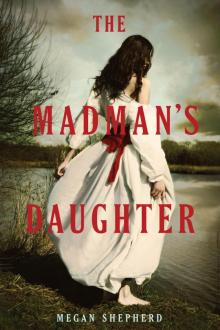 The Madmans Daughter
The Madmans Daughter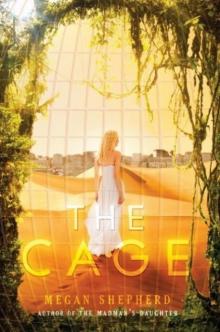 The Cage
The Cage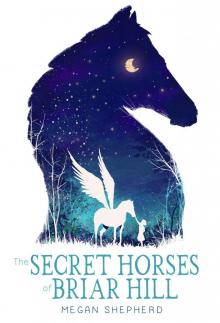 The Secret Horses of Briar Hill
The Secret Horses of Briar Hill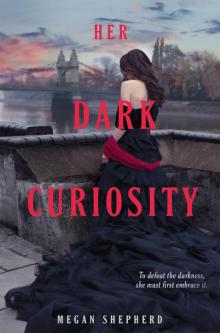 Her Dark Curiosity
Her Dark Curiosity The Hunt
The Hunt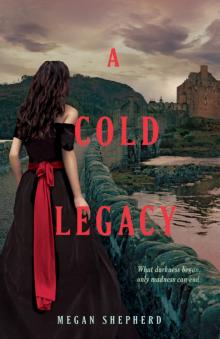 A Cold Legacy
A Cold Legacy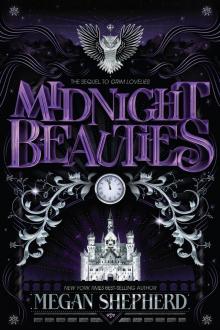 Midnight Beauties
Midnight Beauties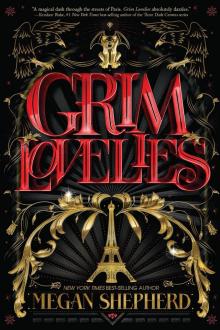 Grim Lovelies
Grim Lovelies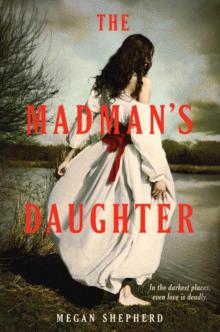 The Madman's Daughter (Madman's Daughter - Trilogy)
The Madman's Daughter (Madman's Daughter - Trilogy)